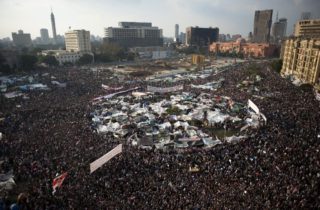But his departure may do little to shake up the corrupt political system that caused the disaster
ONE COULD be forgiven for thinking Hassan Diab a mere bystander, not the prime minister of Lebanon. On August 10th, six days after a massive explosion at Beirut’s port devastated much of the city centre, Mr Diab announced his resignation. In a ten-minute speech he denounced a “system of corruption” that is “bigger than the state”, one that bankrupted the country and crippled basic services. It reached a tragic climax on August 4th, when 2,750 tonnes of ammonium nitrate, stored at the port for six years despite officials’ concerns, abruptly detonated. And despite his position, it was a system Mr Diab was seemingly powerless to break.
At first he did not want to go. The night before he quit, one of his ministers described the government as “steadfast”. But a wave of resignations—by the ministers of justice, finance and others—helped force his hand. It was a minuscule gesture of contrition after a catastrophe that killed at least 220 people and wounded at least 6,000. Hundreds of thousands are homeless. Reconstruction could cost up to $15bn, more than a quarter of Lebanon’s GDP in 2019.
But his departure also reflects the vicious infighting that followed the explosion. Lebanon’s leaders have done little to help victims; instead they are busy trying to shift blame. In a speech on August 8th Mr Diab asked for early elections and said he would remain in office for two months. His call angered some powerful lawmakers, notably Nabih Berri, the eternal speaker of parliament. Mr Berri announced an open session on August 13th at which lawmakers could question the government about the disaster—setting up Mr Diab and his ministers to take the fall.
The government’s resignation will not force early elections. That would require the approval of the octogenarian president, Michel Aoun, and powerful factions such as Hizbullah, the Iranian-backed political party and militia, and Amal, the other main Shia party. All oppose the idea. Instead it will cause a repeat of what happened in October, when the previous prime minister, Saad Hariri, quit amidst widespread protests. Despite a growing economic crisis, lawmakers took two months to agree on a replacement. Lebanon can ill afford such a delay now. Yet it may be difficult to find a candidate both acceptable to parliament and willing to take charge of a country in collapse.
Few Lebanese will miss Mr Diab’s feckless government. The currency has lost 80% of its value on the black market since October. Inflation is at 90% and nearly 250% for foodstuffs. The cabinet put forward a well-received economic plan in March, meant to reduce Lebanon’s crushing debts and clean up its insolvent financial sector, only to backpedal under pressure from bankers and MPs. But Mr Diab, an academic, was set up to fail: the men who wield real power in Lebanon were never keen on the kinds of reforms that might unlock an IMF agreement and foreign aid.
His resignation is unlikely to appease angry protesters in downtown Beirut. Tens of thousands gathered in Martyrs’ Square on August 8th. Small groups seized the foreign ministry, the association of banks and other official buildings. But the crowds were not nearly as big as those that descended on Beirut for mass rallies in October and November. There were no protests elsewhere in the country, and numbers in the capital dwindled on subsequent nights.
Low turnout is understandable: many Lebanese are dealing with the aftermath of the explosion. Countless volunteers still throng the streets of east Beirut, helping families and business-owners clear debris from their ruined properties. Universities have organised teams of engineers to check the structural integrity of damaged buildings. The vast diaspora have contributed money, arranged shipments of medicine and offered vacant homes for the newly homeless.
Cleaning up may prove the easy part, though. To rebuild will require money that Lebanon does not have. Foreign powers have offered a bit of relief. A summit on August 9th organised by the French president, Emmanuel Macron, raised €253m ($297m) to pay for health care, food and other necessities. A bigger aid package will probably require political reforms of the sort Mr Diab failed to implement. In its own statement regarding the donors’ conference, the IMF reiterated that any agreement must be linked to change: a recapitalisation of the banks, with the burden on shareholders and large depositors; a capital-controls law; and an audit of the central bank.
It rarely rains in Beirut in August. But the heavens have opened several times since the explosion. Some wonder if it is an effect of the chemicals belched into the atmosphere. Summer rains falling on homes that now lack windows or doors or roofs add one more bit of misery to a suffering city. Yet its politicians, as ever, are more interested in their own survival. Mr Diab was never meant to be more than a figurehead. Now the search for a new one begins.
The Economist





